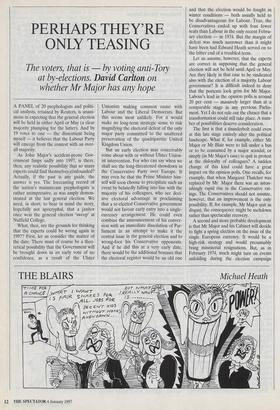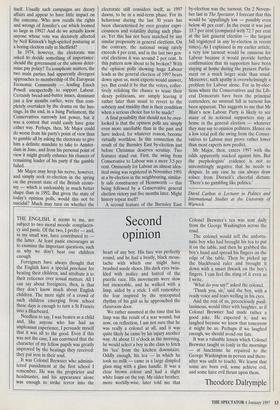PERHAPS THEY'RE ONLY TEASING
The voters, that is — by voting anti-Tog whether Mr Major has any hope
A PANEL of 20 psephologists and politi- cal analysts, retained by Reuters, is unani- mous in expecting that the general election will be held in either April or May (a clear majority plumping for the latter). And by 19 votes to one — the dissentient being myself — it believes that the Labour Party will emerge from the contest with an over- all majority.
As John Major's accident-prone Gov- ernment limps sadly into 1997, is there, then, any realistic possibility that so many experts could find themselves confounded? Actually, if the past is any guide, the answer is yes. The forecasting record of the nation's mainstream psephologists is rather unimpressive, as was amply demon- strated at the last general election. We need, in short, to bear in mind the story, hopefully not apocryphal, that a janitor once won the general election 'sweep' at Nuffield College.
What, then, are the grounds for thinking that the experts could be wrong again in 1997? First, let us consider the matter of the date. There must of course be a theo- retical possibility that the Government will be brought down in an early vote of no confidence, as a result of the Ulster Unionists making common cause with Labour and the Liberal Democrats. But this seems most unlikely. For it would make no long-term strategic sense to risk magnifying the electoral defeat of the only major party committed to the unaltered preservation of the quadripartite United Kingdom Union.
But an early election may conceivably come about with or without Ulster Union- ist intervention, For who can say when we shall see the long-threatened showdown in the Conservative Party over Europe. It may even be that the Prime Minister him- self will soon choose to precipitate such an event by belatedly falling into line with the majority of his colleagues, who see deci- sive electoral advantage in proclaiming that a re-elected Conservative government would not favour early entry into a single- currency arrangement. He could even combine the announcement of his conver- sion with an immediate dissolution of Par- liament in an attempt to make it the central issue in the general election and to wrong-foot his Conservative opponents. And if he did this at a very early date, there would be the additional bonuses that the electoral register would be an old one and that the election would be fought in winter conditions — both usually held to be disadvantageous for Labour. True, the Conservatives ended up with four fewer seats than Labour in the only recent Febru- ary election — in 1974. But the margin of defeat was much narrower than it might have been had Edward Heath served on to the bitter end of a troubled term.
Let us assume, however, that the experts are correct in supposing that the general election will not be held until April or May. Are they likely in that case to be vindicated also with the election of a majority Labour government? It is difficult indeed to deny that the portents look grim for Mr Major. Labour's lead in the opinion polls is around 20 per cent — massively larger than at a comparable stage in any previous Parlia- ment. Yet I do not rule out the chance that a transformation could still take place. A num- ber of possibilities deserve consideration.
The first is that a thunderbolt could even at this late stage entirely alter the political landscape. What if, for example, either Mr Major or Mr Blair were to fall under a bus or to be consumed by a major scandal, or simply (in Mr Major's case) to quit in protest at the disloyalty of colleagues? A sudden change of this kind could have a great impact on the opinion polls. One recalls, for example, that when Margaret Thatcher was replaced by Mr Major there was an aston- ishingly rapid rise in the Conservative rat- ings. The Conservatives should not assume, however, that an improvement is the only possibility. If, for example, Mr Major quit in disgust, the consequence might be meltdown rather than spectacular recovery.
A second and more probable development is that Mr Major and his Cabinet will decide to fight a spring election on the issue of the single European currency. It would be a high-risk strategy and would presumably bring ministerial resignations. But, as in February 1974, much might turn on events unfolding during the election campaign itself. Usually such campaigns are dreary affairs and appear to have little impact on the outcome. Who now recalls the rights and wrongs of Jennifer's ear which loomed so large in 1992? And do we actually know anyone whose vote was decisively affected by Neil Kinnock's high-spirited posturing at a boring election rally in Sheffield?
In 1974, however, the electorate was asked to decide something of importance: should the government or the unions deter- mine pay policy? To complicate matters, the two main parties had apparently divergent approaches to membership of the European Economic Community — leading Enoch Powell unexpectedly to support Labour. Certainly bread-and-butter issues, dominant just a few months earlier, were thus com- pletely overtaken by the drama on the hus- tings. In the end, in a hung Parliament, the Conservatives narrowly lost power, but it was a contest that could easily have gone either way. Perhaps, then, Mr Major could do worse from his party's point of view than to gamble all by asking the electorate to give him a definite mandate to take to Amster- dam in June, and from his personal point of view it might greatly enhance his chances of remaining leader of his party if the gamble failed.
Mr Major may keep his nerve, however, and simply seek re-election in the spring on the present state of the British econo- my — which is undeniably in much better shape than in 1992. But given the state of today's opinion polls, would this not be suicidal? Much may turn on whether the electorate still considers itself, as 1997 dawns, to be in a mid-term phase. For its behaviour during the last 30 years has been characterised by ever greater capri- ciousness and volatility during such phas- es. Yet this has not been matched by any similar propensity in general elections. On the contrary, the national swing rarely exceeds 4 per cent, and in the last two gen- eral elections it was around 2 per cent. Is this pattern now about to be broken? With the opinion polls showing huge Labour leads as the general election of 1997 bears down upon us, most experts would answer, yes. But could it be that the voters, collec- tively relishing the chance to tease their sleazy politicians, are simply leaving it rather later than usual to revert to the sobriety and timidity that is their condition when a serious choice has to be made?
A final possibility that should not be over- looked is that the opinion polls are simply even more unreliable than in the past and have indeed, for whatever reason, become virtually worthless. In this connection the result of the Barnsley East by-election just before Christmas deserves scrutiny. Two features stand out. First, the swing from Conservative to Labour was a mere 3.5 per cent. Ominously for Labour an almost iden- tical swing was registered in November 1991 at a by-election in the neighbouring, similar- ly safe constituency of Hemsworth — this being followed by a Conservative general election victory just five months later. Might history repeat itself?
A second feature of the Barnsley East by-election was the turnout. On 2 Novem- ber last in The Spectator, I forecast that this would be 'appallingly low — possibly even below 40 per cent'. In the event it was just 33.7 per cent (compared with 72.7 per cent at the last general election — the largest fall registered in any by-election in recent times). As I explained in my earlier article, a very low turnout would be ominous for Labour because it would provide further confirmation that its supporters have been staying at home during the present Parlia- ment on a much larger scale than usual. Moreover, such apathy is overwhelmingly a problem for Labour alone. For in by-elec- tions where the Conservatives and the Lib- eral Democrats have been the principal contenders, no unusual fall in turnout has been apparent. This suggests to me that Mr Blair's new Labour Party is likely to see many of its notional supporters stay at home in the general election — whatever they may say to opinion pollsters. Hence on a low total poll the swing from the Conser- vatives to Labour may prove rather lower than most experts now predict.
Mr Major, then, enters 1997 with the odds apparently stacked against him. But the psephologists' evidence is not so unremittingly negative that he needs to despair. In any case he can always draw solace from Disraeli's cheerful dictum: `There's no gambling like politics.'
David Carlton is Lecturer in Politics and International Studies at the University of Warwick.



























































 Previous page
Previous page